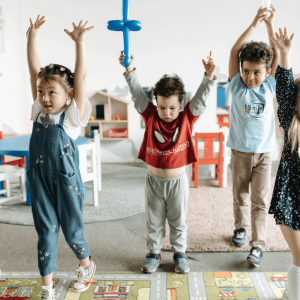When you think of occupational therapy, what often comes to mind are exercises that help children improve motor skills, hand-eye coordination, or even the way they hold a pencil. But occupational therapy (OT) extends far beyond these physical elements. For many children, especially those with developmental delays or social challenges, occupational therapy is also a key to unlocking better social skills. In a cosmopolitan city like Dubai, where children are exposed to a variety of social environments and cultural experiences, these skills are more essential than ever.
Occupational therapy, particularly for children, is about developing the skills necessary for daily life. These skills can range from mastering handwriting and dressing independently to something as foundational as communicating effectively with peers and navigating social situations.
Let’s explore the unique ways occupational therapy can aid social skills development and show you how it helps children not just survive but thrive in social settings.
The Role of Social Skills in Childhood Development
Social skills form the backbone of how we interact with the world. They’re the reason why we can engage in conversation, share our feelings, make friends, and express our needs. For children, having well-developed social skills is essential to building friendships, succeeding in school, and feeling confident in group settings.
Children with social skills challenges often face hurdles in forming friendships, participating in group activities, or even understanding social cues like body language or facial expressions. These challenges can lead to feelings of frustration, isolation, and low self-esteem. In a city as diverse and fast-paced as Dubai, children are exposed to different cultural norms and social expectations, which can make it even harder for those with social difficulties to fit in.
Through targeted interventions, occupational therapists help children improve their ability to engage with others, manage their emotions, and navigate social situations with confidence.
How Occupational Therapy Enhances Social Skills
Occupational therapists work closely with children to develop social skills that can greatly improve their quality of life. Unlike other forms of therapy that focus solely on the emotional or cognitive aspects of social development, OT takes a holistic approach, addressing both the behavioural and physical components of social interaction. Here are some of the ways OT can facilitate development of social skills in children.
Developing Self-Regulation
One of the most critical aspects of social interaction is the ability to self-regulate. Self-regulation refers to a child’s ability to manage their emotions, thoughts, and behaviours in social settings. Children who struggle with this might act impulsively, have meltdowns, or have difficulty following social rules. Occupational therapists use sensory integration techniques to help children become more aware of their bodies and emotions, teaching them how to recognize and respond to these feelings in a healthy way. For example, therapists might introduce calming activities, such as deep breathing exercises or physical activities that allow children to release built-up energy. These techniques help children learn how to stay calm and focused during social interactions, making it easier for them to participate in group activities without feeling overwhelmed.
Understanding Social Cues
Many children with social difficulties have trouble picking up on nonverbal cues like facial expressions, tone of voice, or body language. This can lead to misunderstandings and make it harder for them to connect with their peers. Occupational therapists often use role-playing and interactive games to help children practice reading social cues. They might act out different scenarios where the child tries to identify the emotions of others based on their facial expressions or voice tone. By practicing these skills in a safe and structured environment, children gain the confidence they need to interpret social signals in real-world settings.
Improving Play Skills
Play is a natural and essential way for children to learn social skills. But for some children, especially those with developmental delays or autism, engaging in play doesn’t come naturally. Occupational therapists use play-based interventions to teach children how to take turns, share, and collaborate with others during games or group activities. For instance, therapists might introduce board games or team-building activities where children work together to achieve a common goal. These activities teach valuable social lessons in a fun and engaging way, helping children feel more comfortable in social situations.
Enhancing Communication Skills
Clear communication is the cornerstone of successful social interaction. Children with speech or language delays, or those who struggle to express themselves, may have a harder time making friends or asking for help when they need it. Occupational therapy can complement speech therapy by helping children develop the physical and behavioural skills necessary for effective communication. This can include teaching children how to make eye contact, use appropriate gestures, and express their needs verbally. Therapists also work on teaching conversational skills, such as how to initiate a conversation, listen actively, and respond appropriately to others.
Building Confidence in Social Settings
For children who have experienced social rejection or struggle to fit in, entering a social situation can be anxiety-inducing. Occupational therapy helps these children build the confidence they need to engage with others. Therapists often start with one-on-one or small-group activities where the child feels safe and supported. As the child’s social skills improve, they are gradually introduced to larger group settings where they can practice their new skills with their peers.
Occupational Therapy in Dubai: Meeting Unique Needs
Dubai’s unique cultural landscape presents both opportunities and challenges for children developing social skills. With so many different cultural and social norms, children must learn how to interact in diverse settings, and occupational therapists in Dubai are well-versed in tailoring their approach to meet these unique needs.
Dubai offers a wealth of resources for paediatric therapy, and occupational therapists here work closely with families to ensure children receive the personalized care they need. Whether it’s through sensory integration techniques, play-based learning, or social skills training, engaging occupational therapists in Dubai is designed to help children overcome social challenges and thrive in a multicultural environment.
Long-Term Benefits of Occupational Therapy for Social Skills Development

The benefits of occupational therapy for social skills development are profound and long-lasting. Children who receive OT for social difficulties often experience:
Forming & Maintaining Friendships
As children become more adept at reading social cues and managing their emotions, they’re better able to form and maintain friendships. Strong peer relationships are crucial for a child’s emotional well-being and contribute to a positive school experience.
Increased Self-Confidence
As children gain social competence, they become more confident in their interactions with others. This confidence extends beyond social situations, positively impacting their academic performance, self-esteem, and willingness to try new things.
Better Emotional Regulation
Children who struggle with emotional regulation often find social situations overwhelming. Occupational therapy helps children learn how to manage their emotions in a healthy way, reducing the likelihood of meltdowns or outbursts during stressful social interactions.
Enhanced Communication Skills
Occupational therapy provides children with the tools they need to communicate more effectively. This helps them not only in social settings but also in academic and family environments, where clear communication is essential for success.
In conclusion, occupational therapy offers a holistic approach to helping children develop the social skills they need to succeed in life. From teaching self-regulation and improving communication to enhancing play skills and boosting confidence, OT provides children with the tools they need to navigate social situations with ease. In a city as dynamic and culturally diverse as Dubai, these skills are more important than ever, ensuring that every child has the opportunity to reach their full potential.
FAQs
How does occupational therapy help with social skills development?
Occupational therapy helps children develop the physical, behavioural, and emotional skills necessary for successful social interactions. This includes improving self-regulation, understanding social cues, and enhancing communication skills.
What types of activities are used in occupational therapy for social skills?
Occupational therapists use a variety of activities, including role-playing, interactive games, cooperative play exercises, and sensory integration techniques to help children practice and improve their social skills.
Can occupational therapy help children with autism develop social skills?
Yes, occupational therapy is highly effective in helping children with autism develop social skills. Therapists tailor their approach to the child’s specific needs, focusing on areas like communication, emotional regulation, and social interaction.
Is occupational therapy available in Dubai for social skills development?
Yes, Dubai offers a wide range of paediatric therapy services, including occupational therapy for social skills development. Many clinics provide personalized care designed to meet the unique needs of children in Dubai’s diverse cultural landscape. If you are seeking support for your child, you can reach out to ABLE UK on +971 4 552 0351.


6 comments
Proof of concept for startups
October 23, 2024 @ 8:31 pmI’ll definitely be coming back to read more.
Business growth strategies for startups
October 28, 2024 @ 3:26 amThis is such a well-organized article, I appreciate it!
contextual ad network
October 29, 2024 @ 1:40 amThis article has been extremely useful for me.
Best MVP development services
October 29, 2024 @ 8:28 pmI feel like I’ve gained a lot of useful knowledge from this post.
The Genius Wave for focus and income
November 7, 2024 @ 7:03 pmI appreciate how you make complicated things simple.
tlover tonet
December 5, 2024 @ 4:02 pmI conceive this internet site has some real fantastic info for everyone : D.